Taking Doma people the other side• Magaya hosts 350 in plush hotel • Beneficiaries share city experiences • Self-help projects lined up
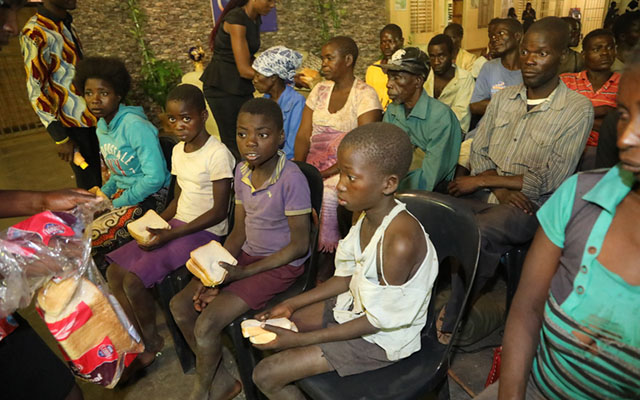
Roselyne Sachiti Features Editor
When 20 kombis arrived in the Doma area, Mbire District, in Mashonaland Central Province, at 1am on Friday September 8, 350 people who had been eagerly waiting since the previous day ululated.
No one fathomed being left behind. The group slept by the roadside in anticipation of a journey into a world they never knew existed. It was the first time for most of them to travel in a vehicle which would take them hundreds of kilometres away from home.
As the Doma people boarded the kombis sent by Prophetic Healing and Deliverance (PHD) Ministries leader Prophet Walter Magaya and his wife Prophetess Tendai Magaya to bring them to Harare, it became a journey of a lifetime.
They passed through Kanyemba, Angwa, Mushumbi Pools, Mahuhwe, Bakasa, Guruve, Ruyamuro, Mvurwi, Concession, Mazoe on their way to their final destination, Harare.
For Miga Arichibuwa (68), her maiden trip to Harare by car was like being chartered to heaven she believed existed on the other side of the country. Coming from a conservative community like Doma, which for years shut out all forms of civilisation, she broke out of her shell to experience life on the other side.
Leaving behind her husband, seven children and grandchildren to jump onto one of the kombis was a painful, but necessary decision she had to make. Her husband had to stay behind protecting their property from wild animals.
“When the kombis came, I jumped up and down. The little girl in me came out as I found a nice spot near the window where I could see everything as the cars moved. I only had clothes I wore that day, all the others are torn,” she told The Herald with excitement. On the kombi, the inquisitive Arichibuwa says she saw enough to write her own book.
“I heard gospel music coming from somewhere in the car. The driver said it was the car radio. I had never heard music play on a radio, I was excited.” As they neared Mahuhwe, they saw a huge bridge and everyone had their own theory of what the structure was.
On further travelling into Mahuhwe, they suddenly saw a long strip of black which made their previously bumpy ride smoother. “The driver said it is just a road that has been tarred. I was excited, I had one more thing to tell my husband back home.”
As they left Mahuhwe, the convoy of kombis went past the sharp-curved Mudzimundiringe Mountain. Arichibuwa was scared and feared her journey would end there.
She would rather walk back home. “I tightly held onto the sides of the kombi for balance. The turns were sharp. It was like the kombi would miss the road and go on a freefall. I wished I never sat near the window and told the driver to stop so that I get off. I asked myself what I had gotten myself into,” adds Arichubuwa amid giggles.
At night, the driver switched on a light in the kombi and Arichibuwa thought the car had caught fire. “I told him to stop and let us get off. He seemed not concerned that the kombi was on fire. He assured me that this was just a harmless light,” she adds.
They eventually arrived in Harare at night and Arichibuwa says she thought the capital city was on fire and was entering the biblical end of the world. “There was fire everywhere. I asked why there was so much fire on houses. I asked if this was not the end of the world. He said it was electricity not fire. I was extremely excited,” she added.
On arrival at the PHD Ministries complex in Waterfalls, Harare, they were treated to bread and soft drinks. It was her first time to eat bread and soft drinks. After the church service, the 350 were whisked away to the PHD hotel in Waterfalls.
“There was a big gate. I have never seen anything like that. I saw more lights, nice buildings and wondered if I was in the right place. I said to myself, if heaven really exists, I have arrived,” she adds. At the hotel, they were led to dormitories, their home for the week.
Upon seeing bunk beds, Arichibuwa was again puzzled. “They told me it’s a bunk bed and one person would sleep on the top bed another on the one at the bottom. Deciding who would sleep on top was hard as no one wanted to climb the small stairs up to the bed. We were also afraid of falling off.
“I rolled and felt the soft mattress do things to my body. I put my head on the pillow and slept like a baby. I only got up at 8am the next morning and my body was so refreshed. Back home I sleep on the hard floor and don’t have blankets. I feel itchy and wake up before sunrise to look for food which is hard to come by,” she adds. They had breakfast and other meals in two huge dining halls at the hotel.
“I just stood there speechless. I thought someone would eventually wake me up from my dream. The dining hall had beautiful red velvet chairs, nice tables with matching table accessories.
“The other dining hall had cream chairs. I chose the red one, it was more beautiful. I was afraid to sit on the chairs as I thought they were meant for other people, not us. We were told we could eat from here, I pinched myself,” she adds.
She queued for food and everything that was put on the plate was bizarre. “They gave us what they said is baked beans, eggs, bacon and sausage. I have never eaten anything like this. In the afternoon, they gave us rice and chicken and beef, and raw cabbage. At home we eat foods that include manyanya fruit, punde, sisito, pumpkin leaves, dudwa and tsapane which grows on river banks, mupama, garatongo (a tuber cooked the whole day so that it does not become poisonous), bepe and masau. Sometimes we don’t eat at all. They gave us what they said is a fork and knife. I could not use any of the utensils,” she adds.
She brags that in the week she has been in Harare, her skin has changed. “My skin is soft and smooth like a baby’s. My hair is all made up. I had never worn new clothes and shoes my entire life,” she says showing off her new look.
Had she not left her husband back home, she says she would stay in Harare forever. “I would have asked Prophet Magaya to give me a job here and work. I thank him for bringing me to Harare. Maybe I will just ask for the bed, it’s so comfortable.”
Chandafira Nyakutepa (48) of Nyakutepa Village has his stories to tell. It is his first time in the capital too. He is happy that he is now in the capital city and has seen what he dreamt of his entire life.
All he wanted to see was how traffic lights work. “Back home I heard a driver from a non- governmental organisation say there is something called a traffic light or robot. He said the colours change from green, then red and orange/ amber.
“He said no one controls the traffic lights it operates by itself. I did not believe him and wanted to witness this myself. I am happy that I now did,” he says.
Now that Nyakutepa has lived his dream, he wants to become a pastor and uplift the lives of his people back home. Siyaso Rangwani (33) said he has been nomadic all his life. It is also his first time to be in Harare.
“Our village head shared his experience when he first came here and I was eager to come. So when the opportunity came, I did not sleep that night. I tossed and turned wondering what it would be like to travel on a car,” he says.
When they arrived at PHD Ministries, he saw huge television sets. On one of the television sets, he saw himself. He was puzzled. “I could not figure out how I was both on the TV and standing in front of people at the same time,” he says with a chuckle.
It was his first time to wear shoes and because of missing toes, walking in them was like taking his first baby steps. He struggled, tried again, and over again until he could walk properly.
When 36-year-old Trymore Magovembere heard stories about Harare he drafted a wish list. Top of the list was his desire to see huge buildings in Harare’s central business district, travel on a car and see bright lights of the capital.
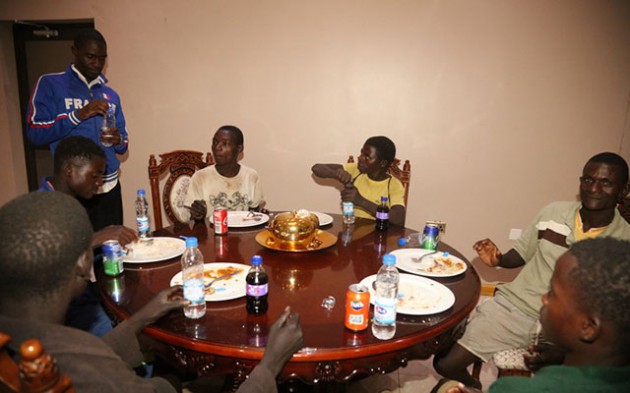
The Doma people enjoying a meal in Waterfalls, Harare, recently. It was their first time to be in the city
Also in the group is Rosemary Kateguru (20). She is expecting her second child and has never been to school. Her first child was delivered in a hut in Kanyemba with the aid of her grandmother. She will do the same with her second child as she cannot afford the demands at the local clinic.
Rosemary is excited to be in Harare and like many others it is her first time to experience everything. She is happy her three-year-old son Maxine came to Harare ahead of his father.
Rosemary says adjusting to the toilet system was extremely hard for them. “We just did not know how to use the toilets so we did what we are used to. Today, the people here were teaching us how to flush toilets and also telling small kids not to fetch drinking water from the toilet pot,” she adds.
For Motion Metera (15), coming to Harare at such a tender age is a great achievement. In their family he is the first. “My parents have never been to Harare. I have never been in school so this journey has really opened my eyes. If I get the opportunity to go to school, I want to be a policeman. I admire their uniforms,” he said.
Chengetai Chibuwa (14) says she has never been in school and only her brother Arnold who is in Grade Zero is the first child in their family to do so. “I want to be a nurse. I like their white uniforms and would like to wear it and help other Doma women deliver babies in clinics,” she says. Nakasai Chibaya (13) was happy to be in Harare and all she wanted to see were different makes of cars.
The first born in a family of five, she did not have other clothes save from what she came wearing. She has also never been in school, so are her other siblings. If she gets an opportunity to go to school, she would like to become a driver. At the hotel, men play soccer against local Premier League team Yadah Stars while women play netball.
Many of the Doma appealed for financial assistance to start bee-keeping projects, goat and chicken rearing and self sustain back home. The 350 Doma people were hosted for a week at PHD hotel. Of the 350, 294 were adults (both men and women) while 56 were children between the ages of 5 and 14.
Prophet Magaya said bringing the Doma people to Harare was a way to motivate them so that he could breakthrough into their society. “When Mama Magaya went there for birthday, it was more like a blocked society. Some of them ran away from them. Bringing them here was also trying to show them a better lifestyle.
“According to records, it was the first time to have at least 200 of them gathering at one point even in their own village because they are shy Agreeing to cut cake with her and be with her shows they received her,” he said.
He said the Doma did not know anything to do with modern life neither did they know him . “This made us realise that there was a community that didn’t know about us and yet they were receiving what we were giving them and their thank you was not an extortion, but genuine.”
Prophet Magaya said initially 58 Doma people visited their hotel two weeks ago. “It was difficult, we wanted 400 at that time but only 58 managed to come. The unfortunate part is that there were other churches and other people who went there to preach and say if you go there Magaya wants to take your lives away, such things like that. “So when the 58 agreed, we kept them for about three days only and sent them back to invite relatives and friends. We then successfully brought the 350.”
Prophet Magaya said when the first 58 came, they were shocked by the warm reception at the hotel. “They said it was the biggest gift they have ever received from anyone. We gave them blankets, spoons, plates, buckets, clothes, money and all those things.
“We also introduced them to church and prayer. They kept on saying thank you for introducing us to this God. They never knew about deliverance, or other things they saw in our ministry so that shock alone gave them the zeal to invite other friends,” he added.
He said he noticed that the Doma people were backward in terms of development. “Doctors that are here are highlighting to them how they are supposed to survive. We are well informed that their tribe is diminishing because of health issues so we are bringing that education and at the same time I’m building a clinic for them. We have already started building a school. “We are also building houses. I can just say we are using a few millions for that,” he said.
He said he finds joy in the genuine thank you from the Doma people. “I enjoy that smile that they get. It is a genuine thank you coming from true appreciation. That joy of taking someone who has two toes and giving him shoes and seeing him smiling because yesterday he was hiding his feet from the world and now he can just take them out at ease. I think it’s the definition of true joy,” he said.
He said the Doma are good on the soccer field and from what he saw, six of them, with proper orientation, can play for any club in the Premiere Soccer League.
“I’m told that they are used to playing plastic balls back home. Of course you then introduce them to better boots, set up, playing positions and all those things. They have a lot of energy because of their way of living,” he explained.
He said they were preparing for life back home by setting up projects. “We will fund a honey, fish, soap making, solar panel making, pads making and many other projects where they use their hands. We have written down all the projects they want and are sending a team to start setting up those things for them,” he pointed out.
“This will force the area to develop because of a lot of production. “I have already bought sanitary pad making machines from China so that Doma women do not face challenges when they menstruate. They can make their own pads and sell them,” he revealed.




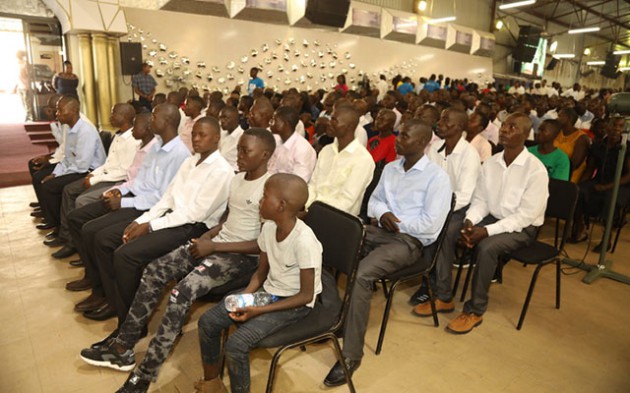
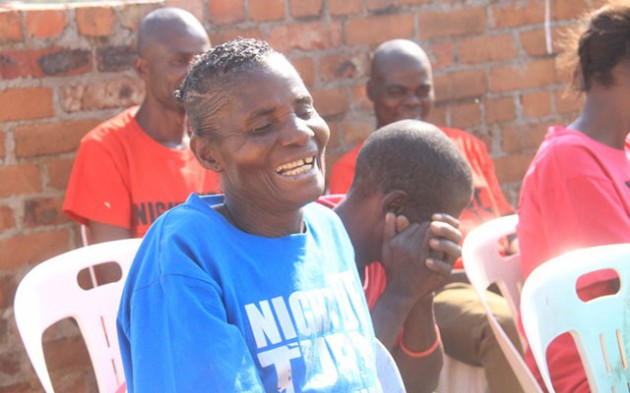

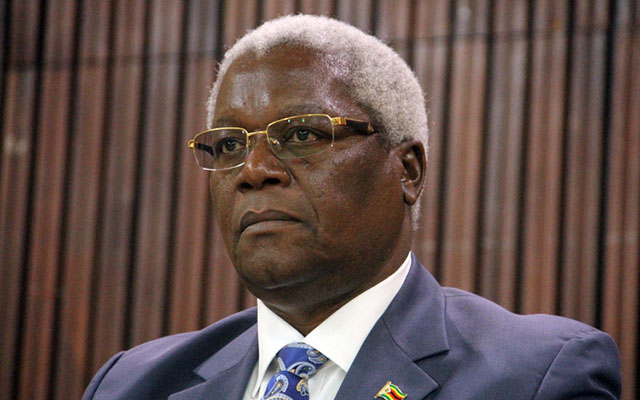





Comments